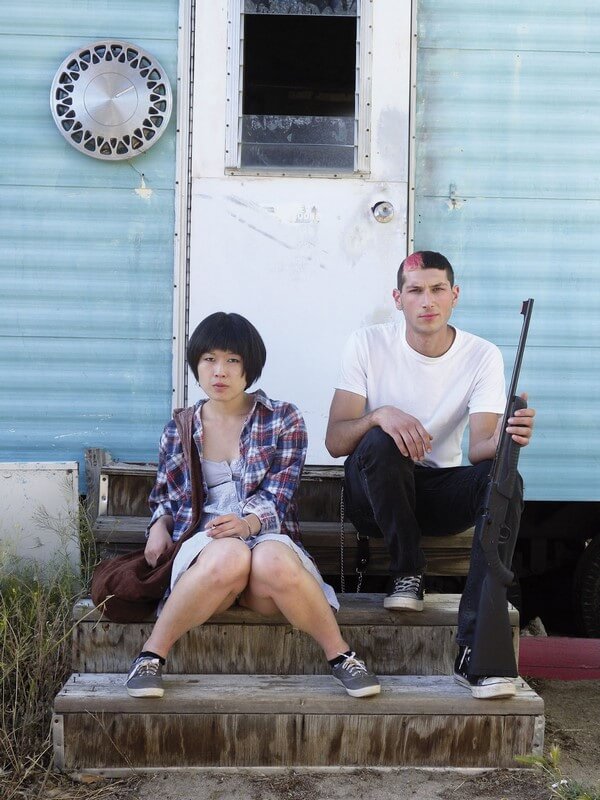Pearblossom Hwy is a movie starring a couple of twenty-something characters who have little to share except their status as outcasts, struggling to belong and ascertain their own identities in an unforgiving world. Cory (Cory Zacharia) is a man who is best described as "not being at school right now"; his career path is less than certain and, in the interim, makes audition tapes for a reality show which he's certain is going to be the making of him if his thrash metal band (Cory and the Corrupts) doesn't catapult him towards fame and fortune first. He's entirely misguided and, in short, lost. Yet, behind the comedy that comes from his complete lack of self-awareness is a profound tragedy. His staggeringly earnest self-filmed videos reveal a man struggling to come to terms with his own identity; a camp, nasal voice often renders people assuming he is gay, something he's not sure how to address and something which infuriates his uber-masculine marine brother. We learn early on that Cory was abandoned by his biological father for reasons he's not entirely sure of which helps to add to his identity problems - how, he ponders, is he "supposed to be a man when there isn't a man around?"
Anna (Atsuko Okatsuka) is similarly a woman with identity issues, trapped as she is between two worlds and cultures into which she doesn't quite fit. Born in Japan but living in the United States, Anna has a deep longing for her would-be homeland, not least when news of her ill grandmother reaches her, but it's made clear that she's perhaps too Americanized for the East; conversely she feels a deep, existential alienation with her current life in the West too. There's nowhere that she can truly call home. Working hard for her Japanese uncle during the day, she spends her night time in seedy hotels entertaining a stream of men, all of whom exploit her in various ways, to save up sufficient funds to leave the country she is just about to take her citizenship test in. Her life is a sad one, to be endured, and she has nothing to speak of except for her friendship with Cory, based as it is, on a connection that only two people who are truly outsiders can share. In this bankrupt world, the bond they have is the only currency that's real.
Over the course of Pearblossom Hwy, the duo begin a quest to help Cory reconnect with the father who abandoned him; they hope this will help add understanding to their lives. Cory wants to know why his marine brother can do no wrong in the eyes of others and he can do no right, despite not displaying any of his sibling's violent tendencies, homophobia and lack of patience or understanding. Cory, to put it frank, is a pure, innocent albeit eccentric soul who struggles to understand much of the cruelty of the world around him or why others choose to mock him and his non-conventional manner. A trip to a stand-up comedy gig results in a barrage of insults, not helped by his sincere proclamations that he'd like to be a reality TV star, with the young man torn completely to shreds in front of an audience. Cory, afterwards, simply intones, with a heartbreaking resignation, that she isn't as funny live as she is on TV.
The film reaches a heart-breaking crescendo with the quiet, subtle imagery of Cory watching an old Chaplin movie; in this instance his face glowed simultaneously with the reflection of the cinema screen and, more importantly, the unadulterated, pure love of the magic of the moment. It’s the only point in the entire film our tragic hero has a moment that isn’t underscored with an overbearing sadness or ominous tragedy; his sanctuary comes with cinema, the wondrous escapism it can provide and how the medium can inspire life-affirming empathy inside us. It’s a delightfully meta moment; watching this sequence I too felt like I was in Cory’s world, bolted as I was to my seat, basking in the warm glow of this deliriously euphoric moment in a movie theatre. It was a snatch of the medium at its most empathetic and a perfect illustration of the power of Ott’s film-making.
Meta too is at the heart of the feature. The movie is made to mirror, in some ways, the two leads' real lives, with the director's stated ambition to blur lines between facts and fiction - Cory's heartbreaking, candid videos are a collection of his real-life thoughts collected over a stretch of time, whilst Atsuko Okatsuka co-wrote the film with Ott; she too has only recently passed her citizenship test. The reality aspect of the feature becomes incredibly apparent in one moment of jolting, bravura film-making which helps to make this amongst the most unique and heartfelt features to be created in some time. It's a magical movie which I simply don't have enough superlatives in my vocabulary to describe and one which, following the sheer joy of Littlerock , inspires my love for the medium of film. It's haunting, powerful, profound; a must see picture for anyone with a love of cinema in their hearts.
* This film screened as part of Bradford Film Festival


No comments
Post a Comment